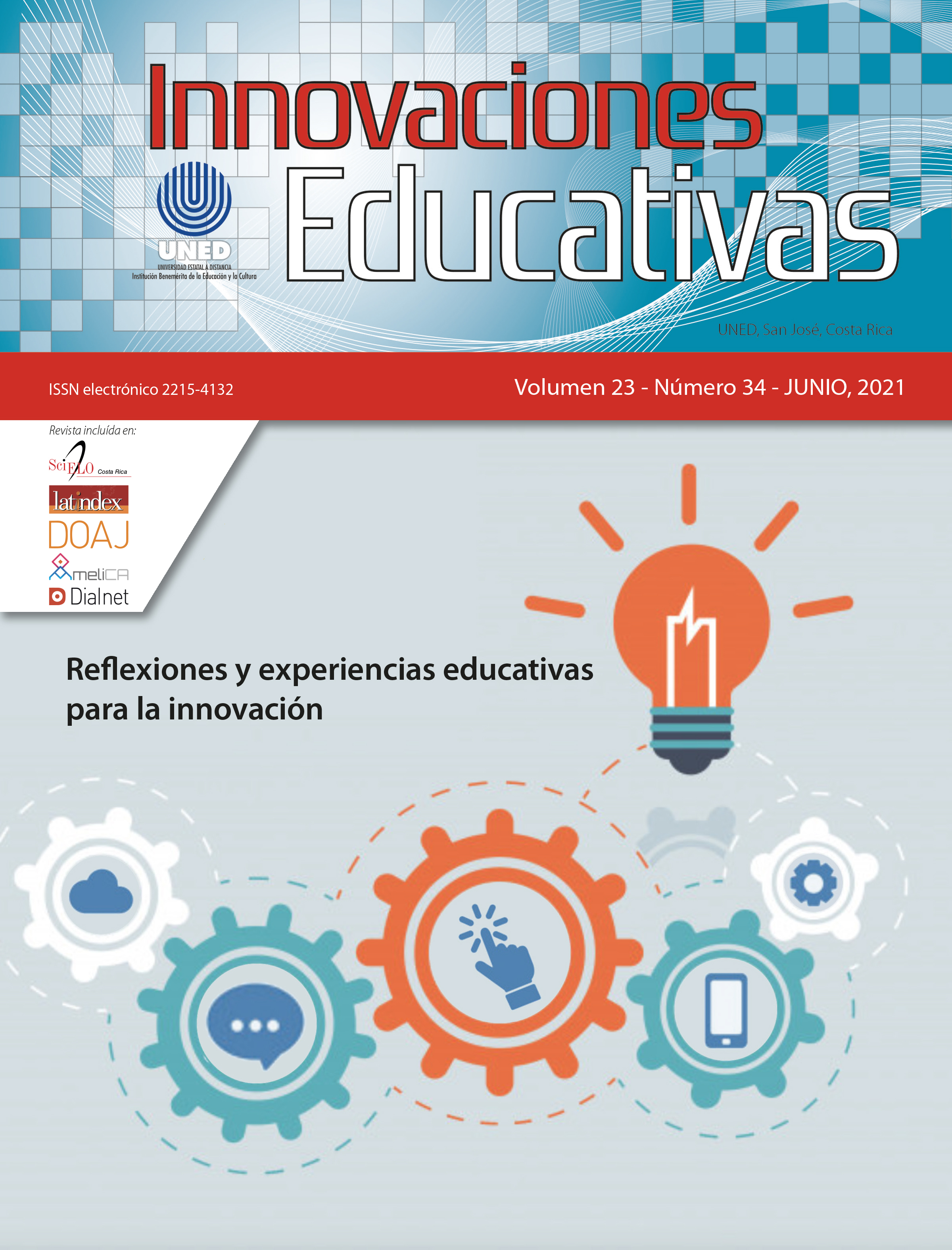Innovate or fail: keys to think about a new institutionalization of learning in the 21st century school
DOI:
https://doi.org/10.22458/ie.v23i34.3451Keywords:
Educational innovation, Mandatory schooling, Classroom, Learning, Teaching, Curriculum, Evaluation of educationAbstract
This essay is based on the following questions: what to do, so that what happens in the classrooms makes any sense? And, what to do today with the modern school? These questions take on value and urgency, not only in the context of the pandemic caused by the virus responsible for COVID-19, which has exposed the weaknesses and potential of societies, states, school and education systems but in addition, in the first decades of the XXI century, in the face of the exhaustion of the massive schooling typical of Modernism in the XIX and XX centuries. In the confinement and preventive isolation, mandatory or suggested in this pandemic, the outbreak has been experienced and evidenced behind the screens –as it usually happens in many classrooms– of complaints and claims from children, youth and adults, synthesized in the question: ‘what is this for?’, with regard to teaching practices and school content. The general objective of this essay is to provide conceptual elements that allow us to think about other school formats and the design of classrooms and classes in which learning and teaching take on new meaning for the student body and the construction of another pedagogical subject. From the historical perspective, regarding social psychology, and pedagogical, didactic and psycho-pedagogical psychology, the analysis presented allows to conclude that it is not a question of ‘breaking’ with the current school. However, based on what exists, it is necessary and possible to institute a synergistic movement of change-innovation whenever the value of teaching is preserved and another conception of learning is institutionalized.
References
Agamben, G. (2007) “¿Qué es un dispositivo?” En Biblioweb Caosmosis. Disponible en: http://caosmosis.acracia.net/?p=700.
Ahumada, P. (2005). La evaluación auténtica: un sistema para la obtención de evidencias de los aprendizajes. Perspectiva Educacional, Formación de Profesores, (45), 11-24.
Anijovich, R. (2014). Gestionar una escuela con Aulas Heterogéneas. Buenos Aires: Paidós.
Anijovich, R. y Cappelletti, G. (2017). La evaluación como oportunidad. Buenos Aires: Editorial Paidós.
Camilloni, A. et al., (2008). El saber didáctico. Buenos Aires: Paidós.
Chevallard, Y. (1998). La transposición didáctica. Del saber sabio al saber enseñado. Buenos Aires: Aique.
Ciancaglini, M. (2016). Modalidad de aprendizaje y comunicación familiar. [Trabajo final Licenciatura en Psicopedagogía. Universidad FASTA Facultad de Ciencias de la Educación, Mar del Plata, Argentina].
Coll, C. (2003). Psicología y currículum. Buenos Aires: Aique.
Da Porta, E. (2015). Medios, tecnologías y redes. Recursos para el conocimiento y reconocimiento de sí. AVATARES de la comunicación y la cultura, (9), 1-17.
Díaz Barriga, F. (2005). Enseñanza Situada. Un vínculo entre la escuela y la vida. México: Mc Graw Hill.
Durkheim, E. [1911] (1984). Educación y Sociología. Buenos Aires: Colofón.
Duveen, G. y Lloyd, B. (2003) Las representaciones sociales como una perspectiva de la psicología social. En J. Castorina (compilador). Representaciones sociales. Problemas teóricos y conocimientos infantiles. Buenos Aires: Gedisa.
Edelstein, G. (2013). Formar y formarse en la enseñanza. Paidós.
Fernández, A. (2000). Los idiomas del aprendiente Análisis de modalidades de enseñanza en familias, escuelas y medios. Buenos Aires: Nueva Visión.
Foucault, M. (1975). Las palabras y las cosas. Buenos Aires: Siglo Veintiuno.
Jodelet, D. (1986) La Representación Social: fenómenos, concepto y teoría. En S. Moscovici, Psicología Social. Buenos Aires: Paidós.
Lewkowicz, I. (2004) Escuela y ciudadanía. En C. Corea y Lewkowicz, I. Pedagogía del aburrido. Escuelas destituidas, familias perplejas. Ecuador: Paidós Educador.
Litwin, E. (2008). El oficio de enseñar. Condiciones y contextos. Editorial Paidós.
Mead, M. (1980). Cultura y Compromiso. Estudio sobre la ruptura generacional. Buenos Aires: Gedisa.
Moscovici, S. (1986). Psicología Social. Buenos Aires: Paidós.
Pineau, P. (2005) ¿Por qué triunfó la escuela?, o la modernidad dijo: ‘Esto es educación’, y la escuela respondió: ‘yo me ocupo’. En P. Pineau, et al. La escuela como máquina de educar. Tres escritos sobre un proyecto de la modernidad. Buenos Aires: Paidós Cuestiones de Educación.
Puiggros. A. (1990). Sujetos, Disciplina y Curriculum en los orígenes del sistema educativo argentino. Buenos Aires: Galerna.
Reaño, A. (2011). El desarrollo de matrices de aprendizajes en contextos familiares violentos. [Tesis de grado de la Licenciatura en Psicopedagogía. Facultad de Investigación y desarrollo educativo de la Universidad Abierta Interamericana].
Ricci, C. (2003 a). Psicopedagogía: aportes para la reflexión epistemológica. Perspectivas metodológicas, (3), pp. 81-89 y En Aprendizaje hoy, 2004 (57), 7-20.
Ricci, C. (2003 b). Algunas dimensiones de la desubjetivación en la institución escolar. Psicoanálisis y el Hospital, (23), 63-67.
Ricci, C. (2003 c). El no-aprender: ¿patología de época o síntoma de la época del no-deseo? Psicoanálisis y el Hospital, (24), 32-36 y En Aprendizaje hoy, (57), 59-63.
Ricci, C. (2004). La institución escolar, ámbito estructurante y subjetivante. Psicoanálisis y el Hospital, (25), 171- 177.
Ricci, C. (2020 a). “¿Qué hacer para que lo que ocurra en las aulas tenga sentido? (¿Qué hacemos con la escuela?)”, Carta al País publicada en Diario Clarín, el día 10 de agosto de 2020. Disponible en: https://estarinformado.com.ar/coronavirus/que-hacer-para-que-lo-que-ocurra-en-las-aulas-tenga-sentido/
Ricci, C. (2020 b). Cuatro tesis para una Psicopedagogía. Apuntes sobre el quehacer psicopedagógico; el objeto psicopedagógico; la Psicopedagogía y la Ciencias Psicopedagógicas y, la investigación psicopedagógica e investigación en Psicopedagogía. Revista Aprendizaje hoy, XL (101/102), 75-116.
Rivas, A. (2017). Cambio e innovación educativa: las cuestiones cruciales. Documento básico. XII Foro Latinoamericano de Educación. Buenos Aires: Santillana.
Stenhouse, L. (1999). Enseñanza y filosofías de la enseñanza. En S. Gvirtz y M. Palamidessi, (2004). El ABC de la tarea docente: currículum y enseñanza. Aique.
Ventura, A. (2015). Dificultades de aprendizaje y psicopedagogía: una perspectiva estilística. Revista Construção psicopedagógica, 23 (24), 6-19.

